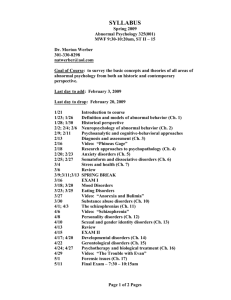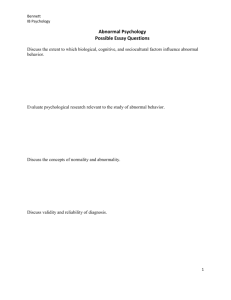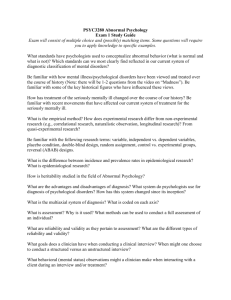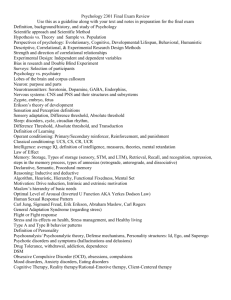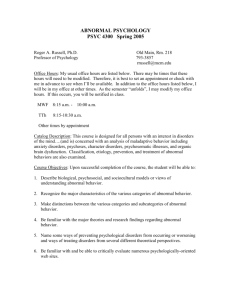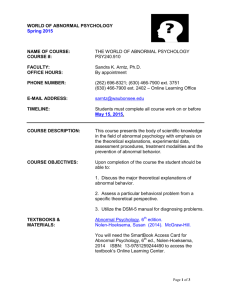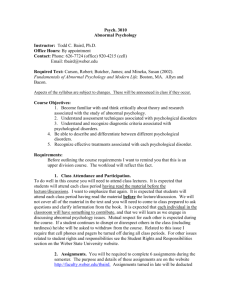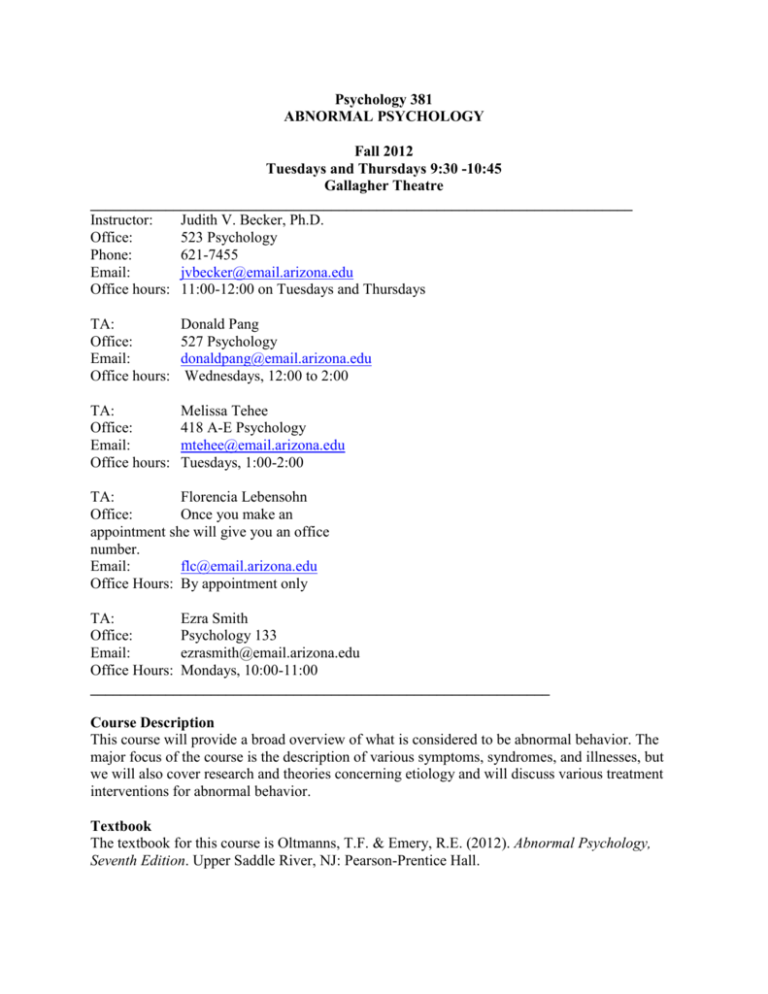
Psychology 381
ABNORMAL PSYCHOLOGY
Fall 2012
Tuesdays and Thursdays 9:30 -10:45
Gallagher Theatre
________________________________________________________________________
Instructor:
Judith V. Becker, Ph.D.
Office:
523 Psychology
Phone:
621-7455
Email:
jvbecker@email.arizona.edu
Office hours: 11:00-12:00 on Tuesdays and Thursdays
TA:
Office:
Email:
Office hours:
Donald Pang
527 Psychology
donaldpang@email.arizona.edu
Wednesdays, 12:00 to 2:00
TA:
Office:
Email:
Office hours:
Melissa Tehee
418 A-E Psychology
mtehee@email.arizona.edu
Tuesdays, 1:00-2:00
TA:
Florencia Lebensohn
Office:
Once you make an
appointment she will give you an office
number.
Email:
flc@email.arizona.edu
Office Hours: By appointment only
TA:
Ezra Smith
Office:
Psychology 133
Email:
ezrasmith@email.arizona.edu
Office Hours: Mondays, 10:00-11:00
_____________________________________________________________
Course Description
This course will provide a broad overview of what is considered to be abnormal behavior. The
major focus of the course is the description of various symptoms, syndromes, and illnesses, but
we will also cover research and theories concerning etiology and will discuss various treatment
interventions for abnormal behavior.
Textbook
The textbook for this course is Oltmanns, T.F. & Emery, R.E. (2012). Abnormal Psychology,
Seventh Edition. Upper Saddle River, NJ: Pearson-Prentice Hall.
Contacting Instructor and TAs
The TAs are here to help you with the course material and any problems you may be having in
the course. Please contact them with any questions about the material. TAs and your instructor
will check for emails periodically, however please be aware that it can take up to 24 hours to
respond to emails. Additionally, emails will not be responded to after 5PM on weekdays or at all
during the weekend. Please be sure to identify the course you are in when emailing (since the
instructor and TAs have other courses they are responsible for); preferably in the subject line.
Please do your best to maintain professional decorum when writing and responding to emails and
your instructor and TAs will do the same.
Evaluation
There will be four multiple choice exams. Each exam will be worth 25 points. The lowest exam
will be dropped, however YOU MUST TAKE THE FINAL EXAM. THE FINAL EXAM
WILL NOT BE DROPPED.
Exam 1:
25 points
Exam 2:
25 points
Exam 3:
25 points
Drop the lowest exam score
Exam 4:
25 points
Total possible: 75 points
To calculate your final grade you will need to add-up the three highest exam points and divide
that number by 75. That is your percentage in the class. We will round up at .5. Please refer to
the table below for what letter grade you would receive. For example, if you took all exams and
the scores are 20, 25, 15, and 18, the three highest scores are 20, 25, and 18. Added together
these give you 63, which is then divided by the total possible points, 75. This gives percentage
of 84. The final grade is a B.
In order to do well on the tests, you should keep current on the readings and attend class. It is all
too easy to fall behind on the assigned readings. Please make every effort to complete the
readings before the class period for which they are assigned. This will enable you to ask and
respond to questions during class discussions.
Your letter grade will be determined in the following way. All students will receive a letter grade
depending on the percentage of total points accumulated over the course of the class. The
following scale will be applied:
90% and above = A
80% - 89%
=B
70% - 79%
=C
60% - 69%
=D
Below 60%
=E
Once the exam is distributed, no one will be allowed to leave the exam room for 20 minutes.
After 20 minutes, students who have completed the exam will be allowed to turn in their exam
and leave. NO STUDENTS WILL BE PERMITTED TO ENTER THE EXAM ROOM
AFTER 20 MINUTES.
THERE WILL BE NO MAKE-UP EXAMS OFFERED. So, if you are ill, and do not come to
take the exam, that exam will count as a zero, and assuming it is your lowest exam score, will be
dropped. If you have a family member who is ill or you go out of town and do not take the
exam, that exam will count as a zero, and assuming it is your lowest exam score, will be
dropped. There will be no make-up exams.
Appeals
To question or review your score and test answers, it must be done within ONE WEEK
after the particular exam. No exceptions will be made. The TAs will have your exams and
they will review them with you at your request.
Absences and Make-up Exams:
All holidays and special events observed by organized religions will be honored for those
students who show affiliation with that particular religion. Absences pre-approved by the UA
Dean of Students (or Dean’s designee) will be honored. In the unfortunate event you should miss
a class; you will have to borrow notes from another class member. You will also be held
responsible for any changes or additions to the syllabus announced in class.
Accommodations:
Students who are registered with the Disability Resource Center are asked to submit appropriate
documentation to the teaching assistant, Donald Pang as soon as possible if you are requesting
reasonable accommodations. If you have any questions or concerns, please contact Donald.
If you anticipate barriers related to the format or requirements of this course, please meet with
me so that we can discuss ways to ensure your full participation in the course. If you determine
that disability-related accommodations are necessary, please register with Disability Resources
(621-3268; drc.arizona.edu) and notify me of your eligibility for reasonable accommodations.
We can then plan how best to coordinate your accommodations.
Extra Credit
Extra credit opportunities will be periodically announced in class. You will have one week from
the date they are announced to complete the assignment. Opportunities to earn extra credit will
only be announced in class (i.e., not by e-mail), thus it is important to attend class to find out
about them. There will be a total of two. Each opportunity will be worth one percentage point for
successful completion. They will be turned in on D2L and more specific directions will be
announced during class. There will be no other extra credit opportunities available.
Academic Integrity:
Any violation of the University’s Code of Academic Integrity, found at
http://web.arizona.edu/~studpubs/policies/cacaint.htm, including cheating and plagiarism, will
lead to a faculty-student conference and possible sanctions. Plagiarism and/or cheating will
result in an automatic ‘0’ on the assignment at hand and if it occurs a second time an ‘F’ in the
course. Be sure to read this Code.
Classroom Behavior:
The university seeks to promote a teaching and learning environment free from material and
substantial classroom disruptions. Consequently, it is expected that all pagers and cell phones
will be turned off during class, that there will be no extraneous talking during lecture, and that
students will arrive at class on time. Additionally, the University prohibits any threatening
behavior, defined as “any statement, communication, conduct, or gesture, including those in
written form, directed toward any member of the University community that causes a reasonable
apprehension of physical harm to a person or property.” The University’s policy regarding
threatening behavior can be found at http://web.arizona.edu/~policy/threaten.shtml.
Office Hours
All four TAs hold office hours please contact them if you have any questions about course
materials or exams.
I encourage each of you to see my TAs or me about anything in the course that concerns you.
You may contact me via email at jvbecker@u.arizona.edu ; I will not be responding to D2L
messages. Nor will the TAs.
Information contained in the course syllabus, other than the grade and absence policies, may be
subject to change with reasonable advance notice, as deemed appropriate by the instructor.
Date
Topic
Schedule of Topics and Readings
Readings
08/21
Introduction and review of Syllabus
Read Syllabus
Th 08/23
Examples and Definitions of
Chapter 1
T
Abnormal Behavior
T
08/28
Causes of Abnormal Behavior
Chapter 2
Th
08/30
Treatment
Chapter 3
T
09/04
Treatment
Chapter 3
Th
09/06
Classification and Assessment of
Chapter 4
Abnormal Behavior
T
09/11
Mood Disorders and Suicide
Chapter 5
Th
09/13
Mood Disorders and Suicide
Chapter 5
Review
T
09/18
Th
09/20
T
09/25
First Exam
Chapters 1, 2, 3, 4, and 5
Anxiety Disorders
Chapter 6
Traumatic Stress, Dissociative, and
Chapter 7
Somatoform Disorders
Th 09/27
Stress and Physical Health
Chapter 8
T
10/02
Personality Disorders
Chapter 9
Th 10/04
Personality Disorders
Chapter 9
Review
T
10/09
Second Exam
Chapters 6, 7, 8, 9
Th 10/11
Eating Disorders
Chapter 10
T
10/16
Substance Use Disorders
Chapter 11
Th 10/18
Substance Use Disorder
Chapter 11
T
Sexual and Gender Identity
Chapter 12
10/23
Disorders
Th 10/25
Sexual and Gender Identity
Chapter 12
Disorders
T
10/30
Schizophrenic Disorders
Chapter 13
Th 11/1
T 11/6
Schizophrenic Disorders
Review
Third Exam
Chapter 13
Chapters 10, 11, and 12,
13
Th 11/8
Dementia, Delirium, and Amnestic
Chapter 14
Disorders
T 11/13
Mental Retardation and Pervasive
Chapter 15
Developmental Disorders
Th 11/15
Psychological Disorders of
Chapter 16
Childhood
T 11/20
Adjustment Disorders and Life
Chapter 17
Transitions
Th 11/22
Thanksgiving No Class
T 11/27
Mental Health and the Law
Chapter 18
Th 11/29
Mental Health and the Law
Chapter 18
T
12/4
Review
Wednesday
Fourth Exam
Chapters 14, 15, 16, 17
December
10:30-12:30
and 18
12th from
Gallagher Theatre
10:30 to
12:30
IMPORTANT NOTICE ABOUT THE FOURTH EXAM:
The final exam for this class is scheduled for Wednesday, December 12th from 10:30am to
12:30pm. Once the exam is distributed, no one will be allowed to leave the exam room for a 20
minutes (i.e., until 10:50 am). At 10:50 am, students who have completed the exam will be
allowed to turn in their exam and leave. NO STUDENTS WILL BE PERMITTED TO
ENTER THE EXAM ROOM AFTER 10:50 am.
Information appearing on the syllabus, other than grade and absence policies, may be subject to
change with advanced notice as deemed appropriate by the instructor.

